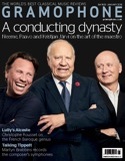Texte paru dans: / Appeared in: |
|
|
Outil de traduction (Très approximatif) |
|
|
Reviewer: Rob Cowan This is not a reissue of the Bach Cello Suite recordings that Thomas Demenga taped for ECM some 30 years ago and that were released on single discs coupled with various contemporary works. These sessions date from 2014 and, in key respects, mark a complete rethink. First, there’s the switch to Baroque manners, which invariably means tuning down a whole tone and using gut strings (‘unwound, not wrapped in aluminium’), most of the performances on ‘a cello from the Testore school of 18th-century Milan’ except for the last Suite, where Demenga uses his Guarneri. For a sampling of how things have changed you need go no further than the Prelude to the First Suite where on this new recording, come the second half of the movement, Demenga speeds along the runway and takes flight, a manner of acceleration that he doesn’t opt for on the earlier recording. Also, there’s the matter of ornaments, another new feature that adds colour and interest to his playing. A good place to sample, or compare new with old, is the Gigue of the Sixth Suite, where ornaments clearly present on the new version are absent on the old. Also listen to the way he leans into the first note of the Fourth Suite’s Prelude, quite different to the comparative formality of the earlier recording. This tendency to emphasise is even more apparent in the following Allemande, which over the years has gained in shape and tonal lustre. The two versions of the Second Suite (where the pitch difference doesn’t apply) are interesting in that first time around Demenga allows himself a subtle degree of vibrato – you hear it most noticeably in the Prelude – which has been ironed out on this later alternative. It’s less a case of preferring one to the other than appreciating both, though viewed overall I find myself gravitating most gratefully to the relative interpretative freedom that Demenga allows himself on this newer recording, its ‘speaking’ quality, not always absolutely pristine, it’s true, but never sounding studio-bound. It’s a case of Demenga, Bach and you, the listener, a triumvirate that emerges unscathed for the duration.
Incidentally, if you have the
earlier version of the Third Suite, which is recorded in a very resonant
acoustic, this drier-sounding remake falls more happily on the ear. It’s a
really great set, though I’ve always liked Julius Berger’s two recordings (Orfeo
in 1984 and Wergo in 1995) which, like Demenga’s, mark an evolving approach to
interpretation (even more so in fact) while, beyond the huge roll-call of
cellist past-masters, Steven Isserlis honours the golden mean as compellingly as
anyone. |
|




